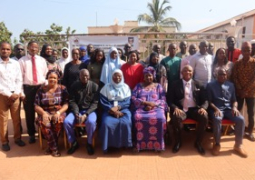
The forum which was held at the conference centre in Bijilo, is supported by the Office of Global Criminal Justice which also serves as an information-sharing platform focusing on the government’s efforts to establish the Special Accountability Mechanism.
Speaking at the convergence, Hussein Thomasi, Solicitor General and Legal Secretary of the Ministry of Justice, recalled that the government in May 2022 issued a White Paper that agreed to implement 263 out of the 265 TRRC recommendations.
In the government White Paper, he said “there was a call for the establishment of a special accountability mechanism which includes the Special Prosecutor's Office, the Special Criminal Division of the High Court, and the Special Tribunal to investigate and adjudicate the human rights violations recommended by the TRRC for prosecutions.”
This commitment, he went on, demonstrates the government’s dedication to honoring the voices of victims and affected communities while addressing human rights violations that were committed in Gambia and on Gambian soil.
Didier Gbery, ICTJ head of Programmes in The Gambia, said: “The establishment of special accountability mechanisms and the intended creation of an internationalised hybrid court represented essential steps towards achieving the rights of victims to justice and accountability.”
These mechanisms, he added, “were not only vital for the victims of the atrocities committed during the Jammeh era, but they were also for reinforcing the rule of law, fostering national healing, and ensuring that future generations could live in a society founded on respect for human rights, democracy, and justice.”
The stakeholder’s forum, Gbery continued, aimed to discuss the government’s efforts and initiatives to advance accountability in the post-TRRC context.
“We intend to do that regularly to update stakeholders and the public on the progress of implementing the accountability-related recommendations of the TRRC. Therefore, this will serve as a platform to discuss how we as stakeholders can collaborate and contribute to advancing this critical agenda,” he postulated.
Priscilla Yagum Sise, who was speaking on behalf of the Alliance of Victim-Led Organisation (AVLO), spoke at length on the significance of criminal accountability.
She however, was quick to add that: “There are several challenges that could be the large-scale nature of many international crimes that often lead to an impunity gap,” she stated.
This, she went on, could be “exacerbated in post-conflict societies where political will may be lacking and legal infrastructures may be severely weakened or non-functional.”
“Effective prosecution strategies are typically focused on high-ranking officials, the planners, and organisers rather than low-level perpetrators,” she emphasised.
Concluding, she said: “Measures should be in place to ensure that identified perpetrators at different levels are held accountable for their part in committing human rights violations in the country.”
Read Other Articles In National News
GBOS releases 2025 GLFS findings
Sep 24, 2025, 11:39 AM




